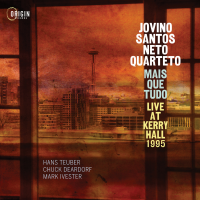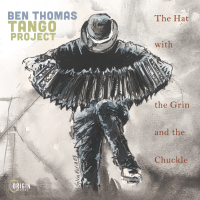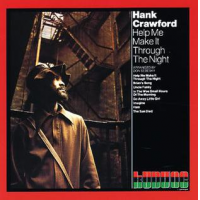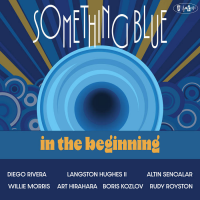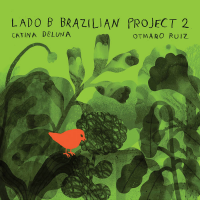Home » Jazz Articles » Liner Notes » Ornette Coleman: Ornette At 12 / Crisis
Ornette Coleman: Ornette At 12 / Crisis
It was an era of citizens claiming hard-won freedoms as civil rights, of youthful energies fueling fast changes and expressive artistic innovations—but also of backlash, assassinations, inequalities, riots and war. The music Coleman and his band of devotees made—available here on CD for the first time after being out-of-print and essentially unavailable for almost four decades—captured then and still reflects that entire spectrum of experience. These two albums present as no one else but Coleman's tight-knit clan could the confluences of melody and noise, harmony and dissonance, flow and accent, individuality and unity that still course through our complex world today.
Ornette employed his alto saxophone, trumpet and violin to conjure happy, sad, bluesy, mad, terrible, beautiful torrents of sound. Without doubt he intended his music to convey meaning, packed as it is with layers of information that are transparent although they often converge inextricably. One is hard-pressed to give words to his messages; these songs and improvisations are not, after all, verbal or literal but rather emotive communications, meant to be delivered and received directly, without process or intermediary, as persons' sounds to peoples' ears.
That was the essence of Ornette's concept, called at various times "free jazz," harmolodics and sound grammar. He delighted in telling a story of asking a grade school class, "What is music?" and a little girl answering, "When you put your feelings in sounds." Yes, Ornette believed, that's it! He longed to enable humans to engage clearly, spontaneously, core to core.
Ornette's own unique, heartfelt and headlong rush of musical declarations, extrapolations, exclamations, queries and quirky asides was abetted in these two albums recorded seven months apart by players steeped in his concept. He'd played with

Dewey Redman
saxophone, tenorb.1931

Jimmy Garrison
bass, acoustic1934 - 1976

Elvin Jones
drums1927 - 2004

Charlie Haden
bass, acoustic1937 - 2014

Don Cherry
trumpet1936 - 1995
Seldom does music that's half-a-century old seem so fresh, still fierce and inspiring as Ornette at 12 and Crisis , but then these albums are by their era's most commanding improvisers as well as one who was just beginning. The timeless nature of these musical statements results, I think, from the fact that the players were addressing frankly, without varnish, immediate aspects of their personal lives. Art created by powerful individuals collaborating to stretch themselves and their medium has, it seems, a certain mojo that endures.
In August 1968, when Ornette at 12 was recorded live at of Hearst Greek Amphitheatre, University of California, Berkley, Ornette (Ralph Denard Ornette Coleman, b. March 9, 1930) was nearing 40, his star set but his frustration with what it was needed to negotiate the music business and institutionalized bigotry on the rise. In response, he doubled down on his faith in innocence and unfettered self-expression regardless of formal chops by picking up the trumpet and violin—he'd not previously studied either, but his point was that didn't matter—and by enlisting Denardo in his troupe.
Pre-adolescent Denardo, about to return to school in California where he lived with his mother, writer and activist Jayne Cortez, after a summer in New York City with his dad, may have felt he had something to prove. Two years earlier, at age 10, he'd suffered a drubbing even from Ornette-loving critics, fans and other musicians for his debut on Ornette's trio album The Empty Foxhole. Well, Denardo had studied, he'd practiced, he'd improved and he would prove it with Ornette at 12, drumming fluently if unusually, having devised a distinctive approach to rhythm he's refined and applied ever since. Ornette's heir, in 2017 he is the most significant keeper of the Coleman flame.
Partnered with Denardo on Foxhole in '66, Haden had made ambivalent or ambiguous comments about the kid, but their interactions on both Ornette at 12 and Crisis suggest they'd found their pocket, implicit or understated though it may be. In '68 Haden had kicked his heroin habit after several years in the Santa Monica-based Synanon drug rehab program, moved to New York City and become the father of a son. He was trying to position himself as a sturdy anchor for diverse stylists, at work with

Keith Jarrett
pianob.1945

Denny Zeitlin
pianob.1938

Henry "Red" Allen
trumpet1906 - 1967

Carla Bley
piano1938 - 2023
Redman himself was having a red-letter year. Becoming identified as Ornette's alter ego had raised his profile and led to opportunities—he would soon join Haden in Keith Jarrett's American Quartet. Also like Haden, Redman became a father in '68, having two sons—

Joshua Redman
saxophoneb.1969
Cherry, like Haden, had moved east from Los Angeles with Ornette to affect the Shape of Jazz to Come in 1959, and subsequently paired up with Coltrane,

Sonny Rollins
saxophoneb.1930

Albert Ayler
saxophone, tenor1936 - 1970

George Russell
composer / conductor1923 - 2009

Archie Shepp
saxophone, tenorb.1937

Pharoah Sanders
saxophone, tenor1940 - 2022

Gato Barbieri
saxophone1934 - 2016

Karl Berger
vibraphone1935 - 2023

Ed Blackwell
drums1929 - 1992

Henry Grimes
bass, acoustic1935 - 2020
Jazz in 1968 and '69 was at the crux of change. Psychedelic and hard rock from Great Britain as well as Greenwich Village, San Francisco, L.A., Chicago, Nashville, Memphis, et al, had surged in popularity among young audiences, scoring commercial successes beyond all previous experience and anyone's expectations—the Monterey Pop festival had been staged in '67, the Woodstock festival was to make its splash in August '69. Although beloved jazz elders and masters including

Louis Armstrong
trumpet and vocals1901 - 1971

Duke Ellington
piano1899 - 1974

Count Basie
piano1904 - 1984

Ella Fitzgerald
vocals1917 - 1996

Benny Goodman
clarinet1909 - 1986

Dave Brubeck
piano1920 - 2012
In the wake of Coltrane's death in 1967, the so-called "new thing" or avant-garde—iconoclastic efforts that had erupted from jazz's past to take daring steps forward—more than ever looked to Ornette for direction. He was an intrinsically shy man, yet his gentle, inquisitive persona prevailed even while more flamboyant or aggressive Albert Ayler,
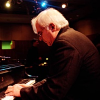
Paul Bley
piano1932 - 2016

Sun Ra
piano1914 - 1993

Cecil Taylor
piano1929 - 2018
His idiosyncratically memorable phrases, as on "C.O.D." (Cash on delivery? Certificate of Deposit?) launched statements that might go anywhere—and though he often employed similar materials (compare the opening intervals of "New York" and "Broken Shadows") he never repeated himself. His ballads were somberly, achingly intimate. His trumpet playing, for example on "Rainbows," lacks the range or variety of his alto sax, however retains his urgency and instantly identifiable voice. His violin sawing, as on "Bells and Chimes," may be a triumph of what Harold Hill in "The Music Man" dubbed "the think system," but is stirring nonetheless.
Throughout all, Ornette brings out the best of his colleagues. The loose quartet of Ornette at 12, no less than the fuller ensemble of Crisis, (recorded at New York University's Loeb Student Center in March, 1969) explores multiple dimensions, of simultaneously, of the indelible themes, comprising separate minds exploring by their own lights a single esthetic.
The rendition on Crisis of Haden's anthem "Song for Che" is definitive. "Space Jungle" is perhaps a precedent for "Endangered Species" on Song X, which Ornette recorded with

Pat Metheny
guitarb.1954
True story: As a college student in 1968 I bought Ornette at 12 when it was originally issued, listened once and hurried back to my campus record store to return it. I don't recall why, but I could not cope with the music. I had no such problem with Ornette's next albums, Friends and Neighbors and Science Fiction, both of which I embraced enthusiastically, spinning over and over. When finally made available, Crisis was familiar as an old friend.
Now Ornette at 12 and Crisis sound to me as if they were recorded yesterday, or tomorrow. They demonstrate how to open oneself to life as it is, and forge something satisfying if never fixed of the matters at hand. There's no nostalgia attached to these albums; rather, they bespeak relevance. It's great to hear them again. It's important to have them back.
Liner Notes copyright ? 2025 Howard Mandel.
Ornette At 12 / Crisis can be purchased here.
Contact Howard Mandel at All About Jazz.
Howard is a Chicago-born writer, editor, author, arts reporter for National Public Radio, consultant and videographer. Visit Howard at howardmandel.com.
Personnel
Ornette Coleman
saxophone, altoAlbum information
Title: Ornette At 12 / Crisis | Year Released: 2017 | Record Label: Real Gone Music
Tags
Comments
PREVIOUS / NEXT
Support All About Jazz
 All About Jazz has been a pillar of jazz since 1995, championing it as an art form and, more importantly, supporting the musicians who make it. Our enduring commitment has made "AAJ" one of the most culturally important websites of its kind, read by hundreds of thousands of fans, musicians and industry figures every month.
All About Jazz has been a pillar of jazz since 1995, championing it as an art form and, more importantly, supporting the musicians who make it. Our enduring commitment has made "AAJ" one of the most culturally important websites of its kind, read by hundreds of thousands of fans, musicians and industry figures every month.








 Buy Now
Buy Now




